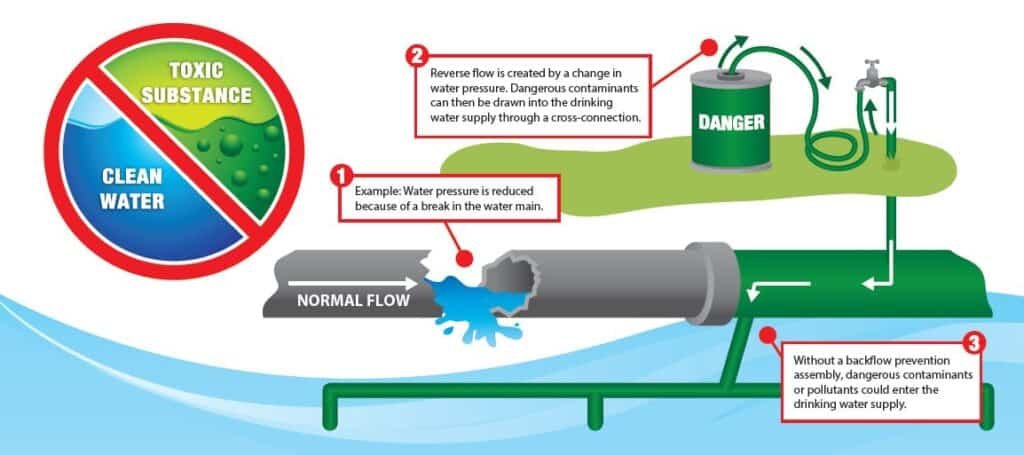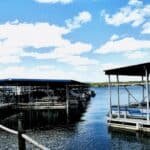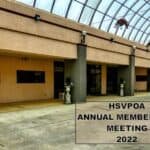Jason Temple, Director of Public Services, presented a proposed policy change to the Board at the July 7, 2021 Board Discussion Session. This proposed policy is called, ‘Cross Connection Control Program.’ The Arkansas Department of Health says, “a cross-connection is a connection of a portable water system to a non-potable system or a system of questionable water quality.”
This issue has to do with an RPZ valve or backflow preventer that is recommended by the Arkansas Department of Health for certain properties including homes with irrigation systems and certain types of businesses. The Arkansas Department of Health recommends that this valve is inspected every year and the Hot Springs Village POA is supposed to keep a record of these yearly inspection reports.

The purpose of these valves is to prevent contamination of the public water system, which can occur in certain circumstances when backflow occurs.
Temple said the Public Services Division doesn’t bring a lot of policy change requests to the Board but they are going to start bringing more new policies and policy revisions in the area of utilities in the next few months.
What is Backflow?
According to the Arkansas Department of Health:
“Backflow, within the context of the drinking water industry, means the reversal of water flow from its normal or intended direction of flow. Whenever a water utility connects a customer to its water distribution system, the intention is for the water to flow from the distribution system to the customer. However, it is possible, and quite common, for the flow to be reversed and flow from the customer’s plumbing system back into the public water distribution system. If cross-connections exist within the user’s plumbing system when backflow occurs then it is possible to contaminate the public water system.”
Some HSV Properties In Non-complaince of Yearly Inspection Recommendation
Many Village Property Owners are noncompliant with the state’s inspection recommendation. The state recently conducted an audit of 8 HSV properties and 7 of the 8 properties were not in compliance with the state recommendation.
This yearly inspection report is kept on file at the Public Service Office.
The state has asked the POA to enact a policy regarding this issue, as this is usually a requirement in most communities.
If the POA makes this addition to its policies, it gives the POA the authority to enforce the recommendation from the Arkansas Department of Health that an inspection on these valves is conducted on a yearly basis.
This yearly inspection is often done by a certified plumber but can be done by anyone having the proper certification and the cost is approximately $55 to $75.
Stephanie Heffer, Director of Programs and Operations said this “would have to be a part of our rules and regulations so the people are aware of their personal responsibility to have an inspection.”
Dialog at the Board Discussion Session
“Here is one [policy] that we need to incorporate and it’s pretty simple. It doesn’t really affect a whole lot of change for anybody,” explained Temple.
Temple continued, “this is a discussion on the proposed motion to approve a public utilities cross-connection control program.”
“Here is a little background. The Hot Springs Village Cross Connection Control Program has been strongly recommended for adoption by policy from the Arkansas Department of Health for a more safer and controlled water system. This program has been reviewed by the Hot Springs Village Public Services Committee (a long time ago…we’ve been looking at this for some time).”
“Currently the POA requires all residents and businesses to follow the rules from the Arkansas Department of Health and appropriate construction codes, but we do not have a policy in place that would support compliance in this area.”
“The purpose of this [proposed] policy is to provide for the protection of the public potable water supply, to isolate the service connections, any actual or potential pollution or contamination within the consumer premises, and to provide a continuous systematic and effective program of cross-connection control. The Cross Connection Control Program may require additional backflow prevention measures at some [indecipherable] or existing Hot Springs Village commercial, residences facilities to be compliant. Per the program, depending on the actual site condition, will determine if nothing [needs to be done], like a residential home without an irrigation system or a double check valve or a reduced pressure backflow preventer, or an air gap separation would be required at the cost of the consumer. That would also include an annual inspection report to be kept on file at the Public Service Office.”
Hot Springs Village Public Services is audited by the state, annually, to maintain the proper records of current inspections and compliance. This is an additional reason for a Cross Connection Control Program to be supported by POA policy.
“This is something we are already doing kind of in an informal manner. We are just formalizing it. All good utilities, water distribution systems in the cities… have a Cross Connection Control Program. All it is, is commonly what you normally see at homes where you have your own irrigation systems, you have a backflow preventer, that is [installed] after the meter. And that protects water from backflowing into our water system.”
“Say we are fixing a water line down your street and you have an irrigation system at your house. It’s got a leak in it, so to speak. And it’s just been raining and your whole backyard is flooded with water. While we are trying to fix that leak, it creates a vacuum in the distribution line where it is actually sucking water in while we are trying to fix that. That backflow preventer would prevent water from your yard or anything like that from getting sucked back into the system and into our main distribution system. That is basically what it is.”
“Typically everybody that has a backflow preventer is sent a letter every year to require them to have an inspection.” The inspection must be completed by a certified person. Currently, no one on staff has this certification, but we could provide this as a service in the future.
Once a year the state requires the POA to submit a report showing cross-connection control compliance of HSV Property Owners. HSV compliance on this issue needs to be improved and enacting this policy would formalize the need to be compliant.
These types of valves are used in irrigation systems, at the wastewater treatment plants, and at (some) commercial facilities.
HSV was audited by the state and this year out of eight properties audited, only one house had an inspection report in the past three years. A Village dog groomer also has no inspection reports. Because of noncompliance on this issue (only one property the state audited out of eight was in compliance), the POA failed the audit.
When the POA sent out letters in the past requiring this inspection, Villagers called the POA and asked, “what they are going to do? Turn my water off if I don’t get it inspected?” Presently the POA has no authority to take action when people are not in compliance. Hot Springs Village has an estimated four to five thousand RPZ’s, with approximately only 2,000 people in compliance with the inspection requirement.
Director Belair asked how we would prevent unscrupulous inspectors from making unneeded repairs?
Temple said that the POA is not trying to provide this service but just wants to make certain that everyone is compliant so we can say to the state, “we are doing everything you are asking us to do to protect our water system.”
Homeowners are already required to have a yearly inspection, but enaction of a policy gives the POA the authority to make sure the state recommendation is being met in order to help maintain a clean and safe water system. The state is encouraging the POA to enact this as a POA policy.
Director Jones said, “the policy will give us teeth when we go to somebody and say you need an inspection. They will no longer be able to say, “what are you going to do about it?”
Heffer said, “we would then follow the protocol that we have with any compliance case is you get a written letter that you haven’t complied, then you get 30 days to correct it, then you are fined.”
Board Director Omohundro said, “we can manage that.”
Omohundro asked, “do we need to talk about this?”
Chair Joanie Corry said, “it would go for a vote.”
Omohundro said, “my request would be, I would like more information of what is involved here. I don’t think we are just talking about, I’m afraid we are not just talking about irrigation systems. I would like to know what else will be involved with this, at least before we vote on it.”
Temple said he would bring additional information to the Board at the next Regular Board Meeting.
Most likely, this motion will be presented to the Board at the July 21, 2021 Regular Board Meeting.
Click here to read about Reduced Pressure Zone Assemblies RPZ’s.
RPZ Presentation – How it Works
(There is a digitalized voice only at the beginning and end of this video.)
* * *
By Cheryl Dowden, July 8, 2021
Thank you for reading. If you like, please comment below. We love to hear your opinion, but comments must be made using your first and last real name, or they will not be accepted. If you would like to submit an article for publication, please contact us through this website. Be sure to bookmark this website. Click here to visit the Hot Springs Village People Facebook Group.












Walter Chance
07/08/2021 — 8:18 pm
Back flow preventers are a good requirement, however they have only been around about 10 years maybe longer. The best way to handle is to start requiring on new construction. Annual inspections are a waste of time and money. These check valves rarely fail. And fines for someone who does not have one. Ridiculous. Millions of homes don’t have them. They are more crucial in highly concentrated Cities where the populations are 100 times larger than the Village.
Sam Taylor
07/08/2021 — 10:36 pm
Mr. Chance is absolutely correct. Another waste, but an opportunity to bring in money to the POA.
Tucker Omohundro
07/09/2021 — 9:08 am
Mr Taylor the POA would make no money. Also the money the POA gets is the property owners money. The POA is us. They are not a hired company for profit.
Sam Taylor
07/09/2021 — 12:34 pm
I was speaking to the fines for not getting it done. I presume those would go to the POA.
Steve Simpkins
07/11/2021 — 7:08 pm
It will cost them dearly if they do it all and track as supposed to
Steve Simpkins
07/11/2021 — 7:06 pm
I started selling them in the 90’s and seen them come in over 20 years old
Walter Chance
07/09/2021 — 7:12 am
I would also add that in the 50 years of the existence of the Village, homes without backflow preventers have caused ZERO water contamination. It’s when our water mains break. Why don’t we concentrate on replacing water mains. Water boil notices due to contaminated water are caused by these main water lines. Arkansas recommends these preventers. It’s not a mandate. I think it goes without saying we have bigger fish to fry.
Tom Blakeman
07/09/2021 — 8:57 am
RPZ valves, also called vacuum breakers, have been around for a long, long time. Far longer than 10 years. Nothing new. They are a normal requirement for home irrigation, pools, and some commercial operations. The valves, just like our water meters, generally operate trouble free for years. However they are subject to freezing and breaking and must be protected from extreme temperatures.
They are required by code in most municipalities. However, few municipalities ever require testing. Arkansas seems to be the exception. Regardless, the procedure takes only about 15 minutes with the proper equipment. Just like with our grinder systems and water meters, it would make sense to have POA staff trained on the test procedure and do the testing on a regular basis. And just like the grinders, and meters there should be no charge to the customer.
But the far greater risk to our water system’s integrity are the very frequent water main breaks all over the Village. These pose considerable risks as well as costing us millions of gallons of water lost daily, all of which cost us big money. The RPZ issue doesn’t come close.
POA should focus on eliminating the main break problem before wasting more time and money on minor stuff. Ditto for the ridiculous “electronic remote reading water meter project which Mr Temple and those uninformed have been gearing up to push down our throats for a while now. As said: bigger fish to fry.
Norman Hansen
07/09/2021 — 12:29 pm
When I built my house twenty years ago I asked the plumber about a sprinkler system. At that time he said I would need a backflow device and it would need an annual inspection. If this was a policy then why is it not being enforced now? In every place I have lived with a sprinkler system it was a requirement.
Jerry Jamrich
07/09/2021 — 2:57 pm
I just paid $95 for this inspection and it was next to impossible to find someone certified to do it. In the 16 years I have been here my system has never failed. The requirements for certification are time in a classroom, recertification and expensive equipment. Your average plumber would rather do something else. I asked someone in the business how often they found failures and they just smiled. Unless the POA has a method to track sprinkler systems and provide a reasonable rate for certifications,then they are better off doing something else. How many contamination problems have we had in the Village over the years? Fix the water distribution network first and don’t make the homeowner the responsible party to ensure clean water goes into the house. I believe that we homeowners are also paying for that water and service. This seems like a lot of attention to a problem that might possibly happen when our State has many serious issues that are not being addressed.
Steve Simpkins
07/11/2021 — 7:03 pm
If we are going to be the only place in the state to enforce these rules are we going to
Make sure installed proper at right location in yard
Going to add a 2nd meter or require the RPZ is lead free tied into the homes domestic water
Require end check to make sure the many systems in the village on spigot have siphon devices
Who and how is this going to be in-forced
The poa won’t make anything from this it’s claimed but what will it cost and how much staff will be needed to keep up with all of it
Sam Taylor
07/11/2021 — 9:35 pm
If they were wise they’d pass the requirement, sit back and do nothing (let the private sector take care of the inspections), and collect the fines when someone fails to get an inspection.
Kirk Denger
07/19/2021 — 11:20 pm
Protect our drinking water! This affects the Property Owners who have sprinkler systems by far mostly. The rest of us should have anti siphoning hose bibs to prevent herbicides from entering our drinking water. Use your common sense. The POA can monitor sprinkler systems back-flow devices for less than private companies. Next time your water main breaks call your plumber and find out.